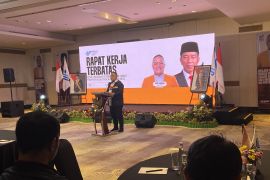Therefore, transportation ministry will offer options to the two online-based taxi services to either become transportation operators or continue to function as application providers.Jakarta (ANTARA News) - The Transportation Ministry confirmed that the operations of GrabCar and Uber taxis are illegal as they are not adhering to Law No. 22 of 2009 on Traffic and Land Transportation, a senior official stated.
"Based on the articles of Law Number 22 of 2009 on Traffic and Land Transportation, the operations (of the two online application-based transportation services) are still illegal until now," Sugihardjo, acting director general of land transportation, informed the press on Wednesday.
He said according to the law, the operations of the two online application-based transportation services are against its articles as they are taxi service competitors.
Therefore, Sugihardjo emphasized that his office will offer options to the two online-based taxi services to either become transportation operators or continue to function as application providers.
If they choose to become transportation operators, they should possess public transportation permits from the Jakarta Transportation Services.
"If they want to become a taxi transportation service provider, for instance, they should install a meter reading device and a special labeling from the police," he affirmed.
Besides this, the drivers should also possess A or B driving licenses based on the classification of the cars they are driving.
If GrabCar and Uber taxis will continue to function as application providers, he noted that they should cooperate with official transportation companies, which are registered as cooperatives.
"There are several rental companies in Jakarta that are legal. So, they can cooperate with those that already have licenses, or they could set up a cooperative body," he explained.
Legal Affairs Manager of Uber Indonesia Teddy Trianto said his side will soon meet the regulations implemented by the government.
"We will encourage our partner to obtain permits based on the governments regulations," he remarked.
Meanwhile, Commissioner of Uber Technology Indonesia Denny Sutadi will also follow the regulations.
"We will also urge the government to inform and communicate with us on what we have to do to comply with the set regulations," he stated.
Adrianto Djokosoetono of the Organization of Land Transportation Owners (Organda) lauded the intentions of the two online-based transportation services and promised to find the most viable solution for all.
Thousands of drivers rallied in front of the office of the Ministry of Communication and Informatics in Central Jakarta on Tuesday, demanding the blocking of online transportation service applications.
The drivers began congregating in front of the office at 1 p.m. local time, with their vehicles, including taxis, three-wheeled cabs known locally as "bajaj", vans, and and minibuses being parked at the Monas Square nearby.
Some demonstrators stopped taxis that had continued to operate and forced their passengers to leave.
Some taxis that continued to operate during the demonstration were also vandalized. A metro-mini bus was damaged, and rocks were found nearby.
"We were attacked just now in Semanggi area," the metro-mini driver revealed.
The protesting drivers sought for the dissolution of cheap taxis using the smartphone applications for serving consumers in gridlocked Jakarta.
The taxi drivers taking to the streets of Jakarta brought certain parts of the capital city to a standstill as they stopped their cars on some main roads.
The drivers staging the rally believe that the private cars offering smartphone application-based taxi services are not a business entity, which are subject to tax regulations and obligated to undergo the vehicle road worthiness tests (KIR).
In response to this rally, the transportation minister has called on the protesting drivers to avoid engaging in violent and anarchic actions.
"The drivers who have taken violent and anarchic actions should be subject to a legal process," he affirmed.
The use of smartphone applications and information technology devices was not a problem, and it could be applied by any taxi operator, he added.(*)
Editor: Heru Purwanto
Copyright © ANTARA 2016











